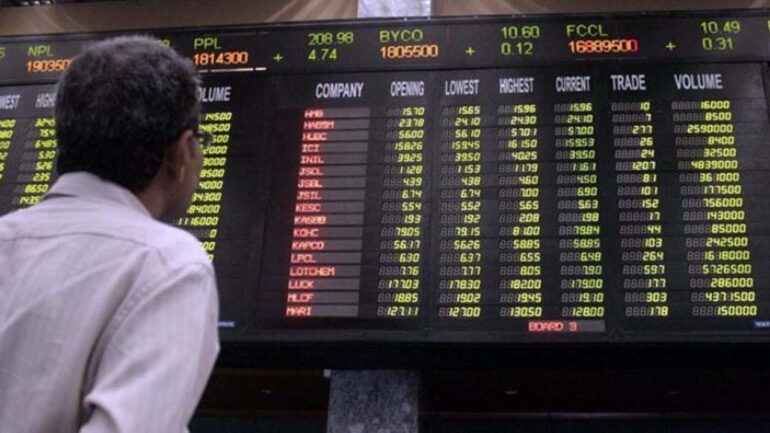Pakistan’s stock market witnessed a remarkable surge on Thursday as the benchmark trade rallied past the 48,000 mark, reaching a 24-month high, amid encouraging developments and positive cues.
Market experts are optimistic about the continuity in the momentum.
The bullish sentiment in the market gained momentum after Pakistan successfully reached a deal with the International Monetary Fund (IMF). Additionally, news about the country’s thriving mineral sector further strengthened the market gains.
According to data, the benchmark trade soared by 957.60 points or 2.03%, concluding at 48,034.59 points on Monday, surpassing the previous close of 47,076.9 points—a significant 21-month high.
Since Pakistan’s staff-level agreement with the IMF for a $3 billion Standby Agreement, the market has witnessed an impressive surge of more than 6,582 points, constituting a 15.9% increase.
Meanwhile, the State Bank of Pakistan (SBP) decided to maintain the interest rate at 22% due to a decline in inflation.
SBP Governor Jameel Ahmed announced the decision following a Monetary Policy Committee (MPC) meeting.
He mentioned that the country’s growth rate was projected to remain between 2% to 3% over the next year.
Furthermore, Governor Ahmed revealed that the government had eliminated all restrictions on imports, resulting in a substantial increase of $4.2 billion in the country’s foreign exchange reserves in July.
The funds received from the IMF and other friendly countries have bolstered Pakistan’s reserves.
As of now, the foreign exchange reserves held by the SBP stand at $8.2 billion, and the governor expects further improvements by December this year.
Addressing the ongoing inflation concerns, Governor Ahmed assured that inflation was anticipated to decrease in the coming months, and more loans would be rolled over to support the economy.
Notably, the SBP has been implementing a series of key policy rate hikes since April 2022, amounting to 12.25 percentage points, primarily aimed at curbing the soaring inflation.
In June, the interest rates were held steady after inflation peaked at 38% in the preceding month. However, towards the end of the month, an emergency meeting led to a rate increase of 100 basis points, driven by a slightly deteriorated inflation outlook, in an effort to secure IMF funds and avert a potential debt default.
The IMF, in a staff report issued earlier in July, urged Pakistan to continue its monetary tightening cycle, shortly after approving a new $3 billion bailout arrangement for the country, which helped in averting the debt default.



